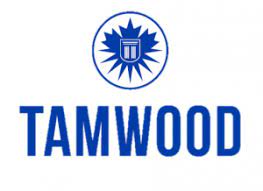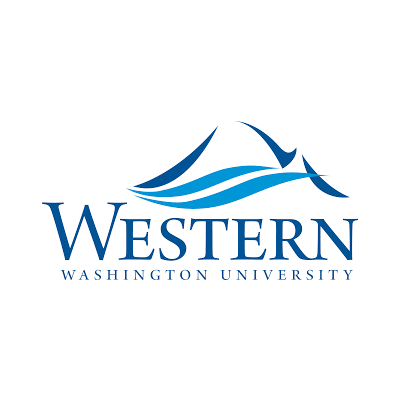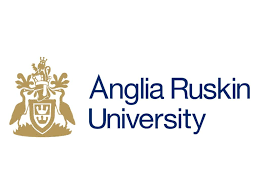J-1 Visa Requirements, Rules, Cost, Processing Time
6 mins read 3298 Views
By Prabhadri Suman|Updated On - 2023-03-25 12:06:19
J-1 Visa Requirements: Check out processing time, rules, cost, age, visa extension, step-by-step process, and interview questions for J1 visa to study in USA as an international student. Click Now!!
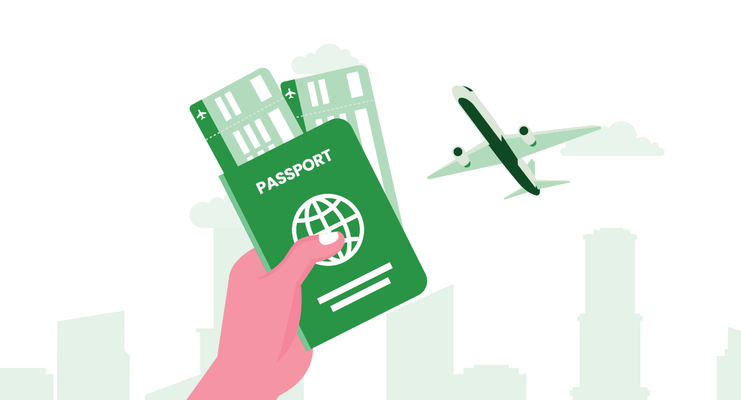
Topics Covered:
- What is J-1 Visa?
- J-1 Visa Requirements
- Processing Time for J-1 Visa
- J-1 Visa Rules and Regulations
- J-1 Visa Cost
- J-1 Visa Age Limit
- J-1 Visa Duration and Extensions
- J-1 Visa Employment
- Difference Between a J-1 and F-1 Student Visa
- Tips for Applying for a J-1 Visa
- Step by Step Process to Submit J-1 Visa Application
- Common Questions asked in the J1- Visa Interview
- Conclusion
Are you interested in traveling to the United States on a J-1 visa and want to know about the J1 visa processing time, rules, requirements, and cost? Currently, there are around 1,70,000 J1 visa holders in the US and they are participating in activities such as work, teaching, and study. There are various types of J1 student visas, and depending on the classification, it allows an international aspirant to take part in activities such as study, travel, training, or work in the US.
If so, you’re in the right place! In this blog, we’ll cover the basics of the J-1 visa, including the processing time, cost, and much more in detail.
What is J-1 Visa?
The J-1 visa is a type of nonimmigrant visa that allows foreign nationals to travel to the United States for a certain period of time. It is typically used for educational, cultural, and research purposes. The J-1 visa is often used for international students, interns, and research scholars.
There are a total of 15 distinct areas in which a person can apply for a J-1 visa.
- Camp Counselor
- Au Pair
- International Visitor
- College and University Student
- Government Visitor
- Secondary School Student
- Research Scholar
- Physician
- Summer Work Travel
- Professor
- Intern
- Teacher
- Short-Term Scholar
- Trainee
- Specialist
J-1 Visa Requirements
In order to qualify for a J-1 visa, you must meet certain requirements.
- Look for sponsors by an organization approved by the U.S. Department of State.
- You must also have proof of adequate funding for your stay in the United States. You must also have proof of health insurance that meets the minimum requirements for the duration of your stay.
- You must demonstrate that you have sufficient knowledge of the English language.
- The person paying your tuition, your sponsor, has to give you and any other people who depend on you all the details about the chosen course of study and hold a session to teach you about the area you will be studying in.
- You and the person who facilitated your J-1 visa need to be sure that you are adhering to all regulations associated with the visa. You also must be aware of your obligations as a J-1 student and your sponsor must be available for emergency help 24 hours a day.
- After finishing your program, you must go back to your native country and remain there for a period of two years or longer.
- You and anyone you are financially responsible for need to make sure that your passports will be valid for at least six months after the end of the program.’
- It is allowed to be employed full-time during the academic hiatus, but one must be registered in full-time studies when the school term is in progress.
- If you want to work while study, you can work part time on campus for a maximum of 20 hours a week. During holidays, you can work full-time. But to work off campus you need permission from your university and sponsor.
- If you move to a new house, it is essential you inform both the person who financially supports you and the college or university you attend of the alteration of your address within 10 days.
Processing Time for J-1 Visa
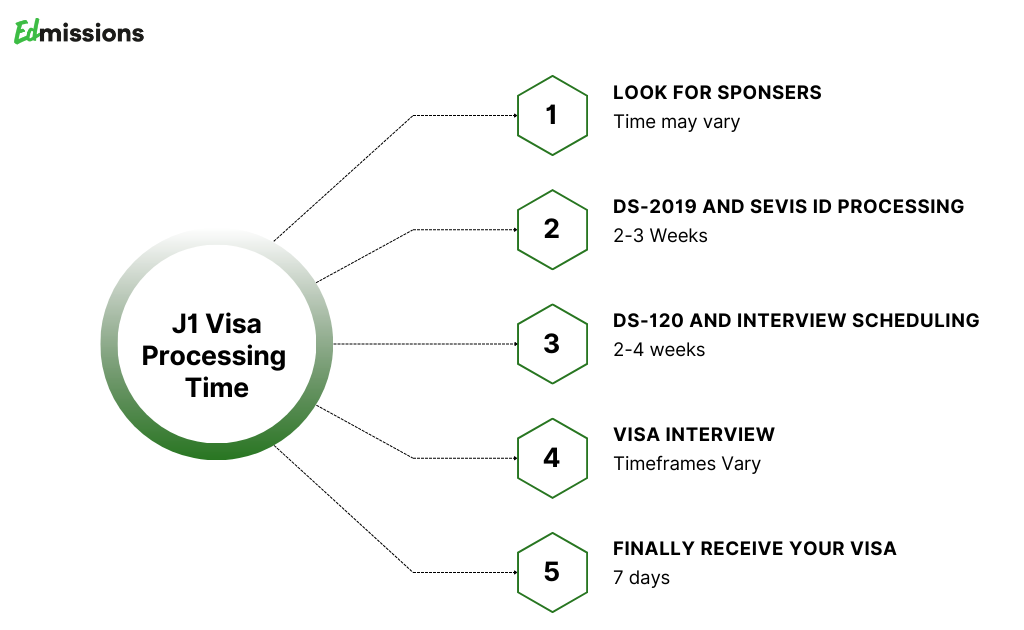
The application process for the J-1 exchange visitor program includes multiple stages, and the length of time it takes to complete will depend on how efficiently you and your sponsoring organization work together. Additionally, the processing time can be affected by the wait time at the embassy or consulate processing your visa. The following steps are involved in the application process:
- Finding a designated sponsor
- Proceed with DS-2019 and SEVIS ID processing
- Completing the DS-160 form and scheduling the interview
- Attending for visa interview
J-1 visa processing time after interview can vary depending on the country. Generally, the processing time is between 4-6 weeks. However, it can take up to 10 weeks in some countries. Additionally, the processing time can be impacted by high demand, holidays, and other factors. It is important to plan ahead and allow enough time for the processing of your visa.
J-1 Visa Rules and Regulations
There are also certain rules and regulations that are needed to follow to get the J1 visa. For example, you must adhere to the visa duration and must not work without obtaining prior authorization. Additionally, you must report any changes in your contact information, including address and telephone number, within 10 days of the change.
J-1 Visa Cost
J1 visa cost varies depending on the country of origin. Generally, the cost is between $160-$185. However, it is important to to know that this is not the only cost associated with obtaining a J-1 visa. You may also be responsible for paying other fees, such as the SEVIS fee and the visa application fee.
J-1 Visa Age Limit
The J-1 visa does not have a specific age limit. However, J-1 visa is basically intended for students, interns, and research scholars who are 18 years of age or older. Additionally, minors under the age of 18 must have written parental consent to participate in the J-1 program.
J-1 Visa Duration and Extensions
The duration of a J-1 visa is typically between 6-12 months. However, it can vary depending on the program and the country of origin. If you need additional time to complete your program, you may be eligible to apply for an extension. Extensions are generally granted for up to 18 months, but this can vary depending on the program and the country of origin.
J-1 Visa Employment
One of the most important rules of the J-1 visa program is that you are not allowed to work without obtaining prior authorization. This means that you must obtain permission from the U.S. Department of State before you can start any employment. Additionally, you must adhere to the terms of your employment and cannot exceed the stated duration of your employment.
Difference Between a J-1 and F-1 Student Visa
Although J-1 and F-1 student visa are quite alike, there are various differences that you should consider when deciding which visa, you want to apply for:
Point of Contact : J-1 visa holders are obliged to work with a Responsible Officer delegated by their program sponsor. The Responsible Officer is tasked to make sure the health, safety, and welfare of J-1 visa holders are taken care of and they abide by all visa requirements. On the other hand, F-1 visa holders have access to a Designated School Official (DSO) of the college or university they are enrolled in. The DSO aids the student in adhering to all visa regulations during their stay in the US.
Job Restrictions : F-1 visa students can take up a job outside campus after they have completed a year of study. On the other hand, J-1 visa students are only allowed to work on campus. Furthermore, the loved ones (partners and kids) of J-1 visa holders are allowed to work and study in the US without any restrictions. However, the dependents of F-1 visa holders are unable to work, but are allowed to attend classes on a part-time basis.
Funding : The source of finance for J-1 students is an accredited educational or charitable organization while F-1 students can be supported by funds from their friends and family, or even their own money.
Certificates : When applying for a J-1 visa, the applicants must submit a DS-2019 Form, which provides the details of the program, the costs, the length of the program and the financial support available. For F-1 students, they must submit an I-20 Form with the same information.
Also helpful: F1 Visa Interview Questions and Answers for Students
Tips for Applying for a J-1 Visa
Applying for a J-1 visa can be a daunting task, but to simplify the process, here are a few tips:
- Start the application process early to ensure that you have sufficient time for the processing of your visa.
- Ensure that you have all the required documents before submitting your application.
- Make sure that you meet all the requirements for the J-1 visa program.
- Contact the U.S. Department of State with any questions or concerns that you may have.
Interested in studying abroad? Our Experts will evaluate your profile for FREE
Step by Step Process to Submit J-1 Visa Application
If you wish to apply for a J1 visa in the US, you must take the steps outlined below:
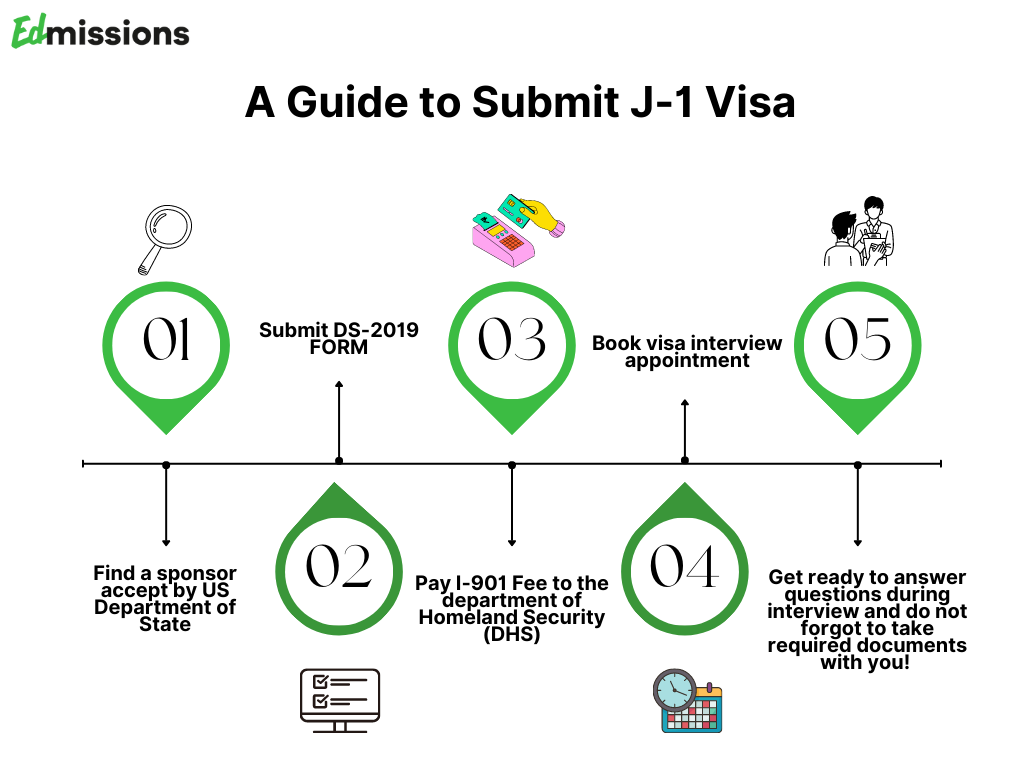
- Find a sponsor who will finance your program: The sponsor has to be accepted by the US Department of State.
- Submit Form DS-201 9: This form serves as evidence of your eligibility for J-1 status. If you are travelling with dependents, be sure to get the correct version of the form. It must be issued by the designated sponsor.
- Fee : Besides the cost of the program, other fees must be paid during the application process. You need to pay the Student and Exchange Visitor Information System (SEVIS) I-901 fee to the Department of Homeland Security (DHS). Additionally, a visa issuance fee as well as a non-immigrant visa application processing fee must be paid at the US embassy in your homeland. Fortunately, these fees are not necessary for those whose program is funded by the US government or is supported by the Department of State, US Agency for International Development (USAID).
- Make an appointment for the visa interview: It is necessary for a consular officer to speak with you at the United States Embassy or Consulate nearest to you to assess your application. As the amount of time, it takes to process a visa varies from nation to nation, you should book your interview accordingly.
- Attend Interview: In order to be approved for a J1 visa US application fee, an interview must be had with a consular officer in which they will try to grasp the reasons for wanting to visit the US.
Common Questions asked in the J1- Visa Interview
- What led to the choice of studying in this specific field?
- Is there an aim to obtain more education in the country?
- What is the occupation of your parents?
- Who is financing your studies?
- Is there a plan to return to the job you had before the exchange program?
- What are your aims in terms of employment at present?
- What is the motivation to be a part of an exchange program?
At the time of the interview, you must bring:
- A valid passport
- A copy of the photo you will use for your visa
- DS-160 and I-901 SEVIS payment confirmation receipts
- I-20 form
- Diploma, school transcripts, and official standardized test scores
- Bank statements you used to complete your college application
Also check: M-1 Visa Requirements, Rules, Cost, Processing Time
Conclusion
The J-1 visa is a type of nonimmigrant visa that allows foreign nationals to travel to the United States for a certain period of time. The processing time for a J-1 visa can vary depending on the country of origin, but it is generally between 4-6 weeks. Additionally, there are certain requirements and rules that must be followed in order to obtain a J-1 visa.
The cost of a J-1 visa is typically between $160-$185, and minors must have written parental consent to participate in the J-1 program. Finally, it is important to start the application process early and ensure that you meet all the requirements for the J-1 visa program. I hope this blog post has been helpful in providing you with information about the J-1 visa.
The Edmissions team is here to provide you with help throughout the college application process. Before you submit your application to your desired college or university, it is recommended that you get in touch with a overseas consultants by registering on the website.
To learn more about application processing, contact our Edmissions specialists at [email protected]
For a quick overview related to study abroad, click here
Latest Blog Posts
Trending Posts
Popular Colleges to Study Abroad
Blog FAQ's
Top Study Abroad Exams
Popular Universities to Study Abroad
- University of Waterloo
Waterloo
- University Canada West
Vancouver
- University of Windsor
Windsor
- Cape Breton University
Sydney
- Dalhusie University
Halifax
- Carleton University
Ottawa
- University of Ottawa
Ottawa
- University of Guelph
Guelph
- Explore more colleges in Canada
- University of New Haven
West Haven
- Kent State University
Kent
- Wright State University
Dayon
- San Jose State University
West Haven
- Clark University
Worcester
- Rowan University
Glassboro
- Golden Gate University
San Francisco
- Arkansas
San Francisco
- Explore more colleges in USA
- Coventry University
Coventry
- University of Birminghame
Birminghame
- De Montfort University
Leicester
- Cardiff University
Cardiff
- BPP University
London
- University of West London
London
- University of Nottingham
Nottingham
- University of Warwick
Coventry
- Explore more colleges in UK
- Auckland Institute Of Studies
Auckland
- Massey University - Auckland Campus
Albany
- Eastern Institute of Technology - Auckland Campus
Auckland
- NorthTec - Auckland Campus
Auckland
- Massey University - Manawatu Campus
Palmerston North
- University of West London
London
- Wellington Institute of Technology (WelTec) - Petone Campus
Lower Hutt
- Otago Polytechnic - Dunedin Campus
Dunedin
- Explore more colleges in New Zealand
- Chandigarh University
Mohali
- Parul University
Vadodara
- Sharda University
Greater Noida
- Jain University
Bangalore
- Bennett University
Greater Noida
- Lovely Professional University
Phagwara
- Chitkara University
Rajpura
- Brainware University
Kolkata
- Explore more colleges in India
- Abu Dhabi University
Abu Dhabi
- Gulf Medical University
Ajman
- New York University
Abu Dhabi
- Emirates Aviation University
Dubai
- Higher Colleges of Technology
Dubai
- British University in Dubai
Dubai
- Al Ghurair University
Dubai
- American University in the Emirates
Dubai
- Rochester Institute Of Technology Dubai
Dubai
- Emirates Academy of Hospitality Management
Dubai
- American University of Ras Al Khaimah
Ras Al Khaimah
- Explore more colleges in UAE
- Ras Al Khaimah Medical and Health Sciences University
Ras Al Khaimah
Search, Shortlist, Apply and get accepted! It’s that Simple to pursue your dream to Study abroad with Edmissions. Our team of experts provide you the right guidance that helps you to take admission in your dream college in countries like Canada, the USA, the UK
© 2021-2024 Edmissions - All rights reserved.
TALK TO OUR EXPERTS






